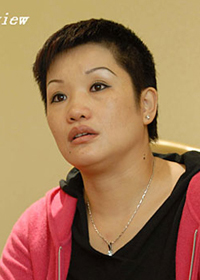|
Ever since her teenage years, Wen Xiujie has been full of dreams and few earthly desires.

In mid-1980s, when Chinese people invented the term "10,000-yuan households" to describe a well-off family with a new fortune from private businesses, 10,000 yuan ($6,667 back then) was the weekly pocket money given to Wen, who was a middle school student. As heiress to the family property development company her father offered her a Mitsubishi sports car as a gift before she turned 20. Back then, most urban families were saving up to buy home appliances, like TV sets, refrigerators and washing machines, which were considered luxury items.
"I started to help my father with the family business at the age of 17, so I have matured faster than my peers," said Wen, who is now 39. "I don't like doing the property development business. My dreams since childhood have been of opening a school, a hospital and a home for the elderly."
Although Wen doesn't like her role as an iron lady president, the fighting attitude she inherited from her father saw her through a down period for the family business in the wake of her father's sudden death seven years ago.
Wen, who was considered by many business competitors too young to preside over the business after her father's death, has expanded the family business to a group company, which has subsidiaries of a property development company, a construction company, an interior designing company and a resort hotel.
"I really don't want to disappoint my father," said Wen. She said that her father had earned enormous respect from business peers for his integrity, warm-heartedness and generosity toward charity causes, and that these were the best lessons her father had taught her.
Wen said her dream of building a home for the elderly also comes essentially from traditional values cherished in her family, one of which is to respect and take care of the elderly. Her father, the first-generation entrepreneur who worked as a farmer and a construction worker, had wished to open a home for the elderly. Wen's mother-in-law is running a private home for the elderly.
In 2005, Wen bought 170,000 square meters of land in the northern suburbs of Dalian, a port city in northeastern Liaoning Province. Surrounded by mountains, only 1,000 meters from seafront and 100 meters away from a large reservoir, the land is in a perfect location for a resort community. After pumping over 100 million yuan ($13.5 million) of investment into this project, Wen had a villa-style community for aged persons, which will be fully completed early next year and can house as many as 1,000 elderly people.
One part of the community consists of 200 two-story villas, which offer 700 beds for tourists. While non-elderly tourists are charged a monthly rate of 1,800 yuan ($243) per person, elderly tourists can get a discounted price of 1,500 yuan ($203) per person. The other part is a four-building apartment complex specially designed for the elderly. Wen hired Japanese architects with rich experience in designing apartments for the aged to design the layout, which is intended to maximize the ambiance of homes for the residents.
The first batch of residents will include 10 elderly citizens from state-run homes for the aged. Their 1,200 yuan ($162) monthly fee will be exempted.
"If I wanted to get the biggest profit from developing the land, an aged-person community would definitely be one of the worst choices," said Wen.
Zhang Jingbo, who was president of Dalian's largest state-owned home for the aged, has been hired as Wen's aid in running the community. Zhang said, "Many people, including myself, told her that even a well-managed private home for the aged can turn in only nominal profits. But she doesn't care. I know that she really wants to do something for the elderly."
To guarantee service quality for the elderly people, a clinic has also been built within the community in partnership with two local hospitals, which will supply medical staff to work there. The community has also partnered with a nurse training school to train attendants for the elderly people. And a small dog-breeding farm has been built in the community so the elderly residents will have lots of pets to keep them company.
"If I can do my property development business well, I can build this community even better since it has been always a dream of mine," said Wen. She named her community Qianhonglian, which literally means A Thousand Red Lotuses. "The lotus symbolizes health and longevity for the elderly people. I want my community to last 1,000 years and be prosperous," Wen explained. | 